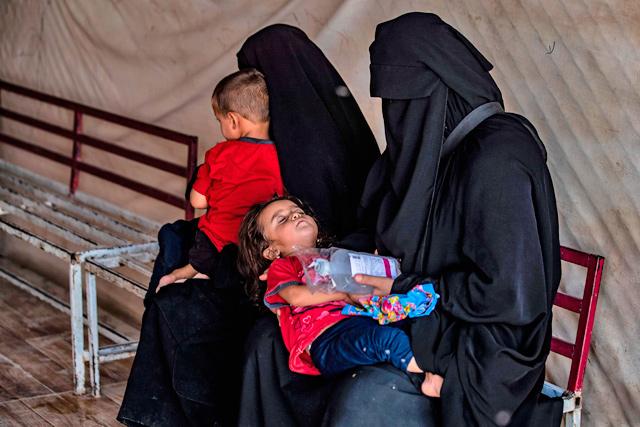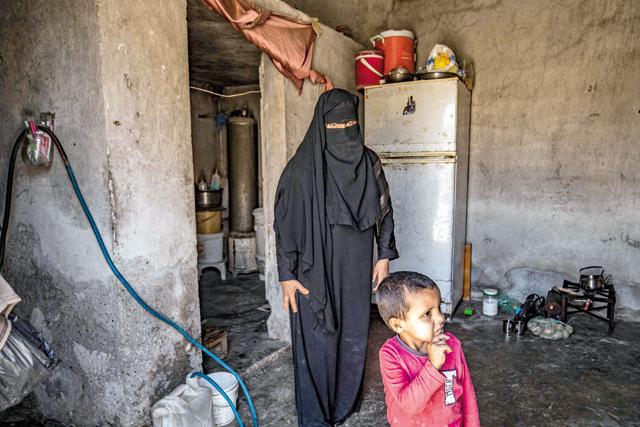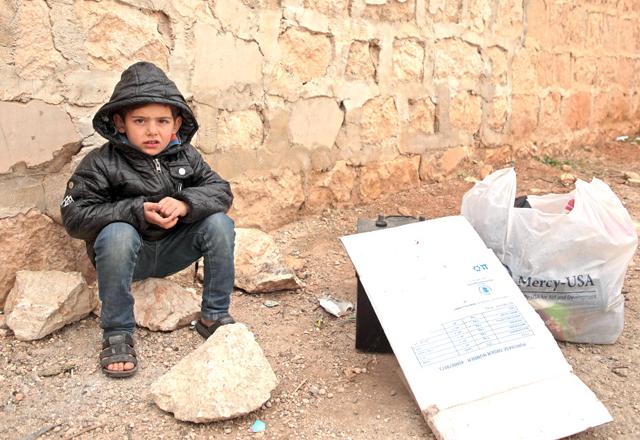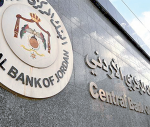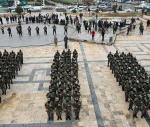You are here
Lebanese long for Daesh-linked relatives stuck in Syria camps
By AFP - Mar 02,2022 - Last updated at Mar 02,2022
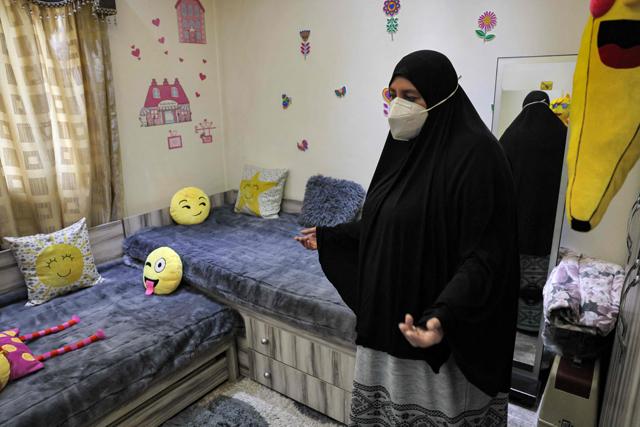
Umm Mohammed Iali, a 50-year-old Lebanese woman whose two sons died fighting for the Daeshe group in Syria and whose granddaughters remain in the northeast Syrian camp of Al Hol, gives a tour of the bedroom she prepared for her granddaughters Mariam and Maria at her apartment in Lebanon’s northern city of Tripoli, on February 10 (AFP photo)
TRIPOLI, Lebanon — For three years, Umm Mohammed Iali has been longing to embrace her granddaughters stuck in Syria since her two sons died fighting for the Daesh group there.
Like thousands of other relatives of extremist fighters, the three Lebanese girls and their mother are being indefinitely held in the northeast Syrian camp of Al Hol.
Sitting in her grandchildren’s bedroom in her home in the city of Tripoli in northern Lebanon, tears stream down Umm Mohammed’s face.
“I have been telling myself they will come back today, they will come back tomorrow — every day for the past three years,” the 50-year-old said.
“I even prepared the bedrooms for their return,” she said, surrounded by heart-shaped pillows and star-speckled walls.
Her oldest granddaughter is 10 and the youngest, born in Syria, is only four.
The Ialis are among dozens of Lebanese families demanding Beirut repatriates their relatives stuck in overcrowded camps like Al Hol.
Al Hol shelters around 56,000 displaced people, including refugees from multiple nations, according to the United Nations. Most fled or surrendered during the dying days of Daesh s self-proclaimed “caliphate” in March 2019, and around half the camp residents are Iraqis.
Daesh in 2014 seized large swathes of Iraq and Syria, ruling its territory brutally until its defeat by local forces backed by a US-led coalition.
The Daesh terrorists continue to perpetrate violence in Al Hol, and the UN has repeatedly warned of deteriorating security conditions there.
Living in ‘misery’
Since the fall of Daesh, Syria’s Kurds — who run a semi-autonomous administration in northeast Syria — and the UN have urged foreign countries to repatriate their terrorist-linked nationals.
But this has only been done in dribs and drabs, as countries fear a backlash domestically, both in terms of the reaction of their citizens and the risk of future attacks on their soil.
Umm Mohammed’s Sunni majority hometown, Tripoli, has long been a hotbed for terrorist fighting against regime forces in Syria’s civil war. Hundreds of young Tripoli men have joined extremists and opposition groups there since the war began in 2011.
Their wives and children often followed them.
Mohammed Iali’s widow Alaa, 30, is one of those women. Her husband was killed in 2019 during the battle to take Daesh last bastion in Baghouz, Syria.
Despite the defeat of the “caliphate” that year, the extremists are believed to have recruited dozens of Lebanese men to join their ranks since last summer.
A security official has told AFP that “financial motives” are the main attraction for the youth of Tripoli, one of the poorest places in a country suffering a financial crisis that has left more than 80 per cent of the population living in poverty.
At least eight Tripoli men have been reported killed in Iraq since December.
After fleeing Baghouz, Alaa was moved to a high-security annex at Al Hol.
“All I want is for this woman and her girls to come back,” said Umm Mohammed, whose dream is to hold her granddaughters tightly.
“I live only for them.”
She told AFP that their tents in the camps fill with muddy rainwater every winter.
“They live in misery, deprived of everything.”
Since Alaa arrived in Al Hol her father, Khaled Androun, managed to meet with her and his granddaughters twice but could not secure their release.
His daughter later tried to flee with smugglers but a landmine exploded during her escape, leaving her wounded, he said.
Androun said the girls need access to education, medical attention and psychological help.
“What will become of the children?” he asked.
The case is in the hands of the General Security bureau, one of Lebanon’s top security agencies.
The agency’s head Abbas Ibrahim should “bring back our kids quickly”, Androun said.
In a statement to AFP, Ibrahim confirmed the case is under his agency’s purview, but a solution has yet to be reached.
“We are waiting for a political decision to solve this issue with the relevant authorities,” he said, referring to the Kurdish administration in northeast Syria that runs Al Hol camp.
‘Bring back the women’
Umm Mosaab, 35, managed to flee Al Hol in 2018 with her two teenage boys after paying a smuggler about $8,000. Her 17-year-old daughter, however, remains detained in Roj, another camp.
Umm Mosaab went to Syria in 2015 to join her husband in Raqqa, Daesh’s de-facto Syrian capital, but he was later killed in battle.
“I haven’t seen my daughter in five years,” she said.
Jailed for nine months after she returned to Lebanon, Umm Mosaab is part of a group of families lobbying Lebanese authorities to return their relatives held in Syria
“My daughter followed me there. How is that her fault?” she asked.
Tripoli resident Noor Al Huda Abbas, 59, said she begged officials to return her seven-year-old granddaughter along with her mother from Al Hol, but all she got was empty promises.
“Bring back the women and arrest any of them that might be suspects,” said Abbas, whose two sons died in Syria.
“I want my son’s daughter... we are not asking for the moon.”
Children born to jihadist parents “did not choose this life”, she said through tears. “But we can change their lives for the better.”
Related Articles
AL HOL CAMP, Syria — Maha Al Nasser queues in front of a crowded clinic in Syria's Al Hol camp, her frail daughter squirming in her arms und
Raqqa, Syria — Noura Al Khalif married a Daesh group supporter and then wound up without her husband in a Syrian camp viewed by many as the
AL HOL CAMP, Syria — At least 517 people, mostly children, died in 2019 in an overstretched Syrian camp housing displaced people and relativ


